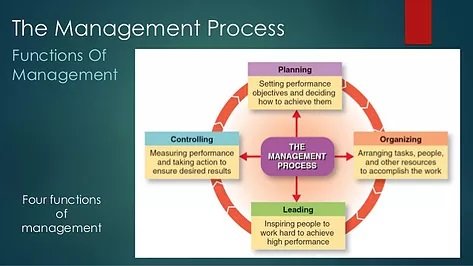
The Purpose
I spend my days helping military Veterans translate their military experience into the language of ‘Civilian’. The majority of those I help are project managers and want to continue this work in the CIVDIV following their end-of-service. However, learning the art of translating your military experience into Civilian doesn’t stop at the boundary of project management; it flows over into other management professions.
The onus to translate your military experience in a meaningful way is on you, the Veteran or Retiree, so I show you how to do this. This article presents the foundation of Civilian management as a point of reference. Framing your military experience from this perspective will allow you to connect with your civilian hiring managers, peers, leaders, and subordinates in a language and with concepts familiar to them.
The Foundation
The discipline of management rests on four primary functions as described ‘back in the day’ (1949) by a gentleman named Henry Fayol. His original work depicted five functions, but has been consolidated to four primary functions over time; planning, organizing, leading, and controlling.
Planning concerns figuring out where we are, where we want to go, deciding how to get there, and describing how we’ll know when we’re there. Once we’ve developed our plan, we resource it appropriately so we can successfully carry it out. Now, as the work starts and while it is continuing, we lead and coach the people doing it and measure operational, programmatic, and strategic performance. If performance and productivity are within our set tolerances, we continue on as planned. If not, we tweak our plans, resource accordingly, lead and coach the people, monitor and control, and so on.
The Disconnect
We Veterans and Retirees talk and think in leading. When we do so, we appear to only be fluent in one area of management. However, the reality is we’ve done them all, all the time. We just need to talk about the others as well because in the CIVDIV, leadership is a nice to have, not a need to have. Organizations have people sitting in leadership spots already, and as you can see in the illustration, we have to instill confidence we can do all four.
The Trick
The trick then is to show them how we can do all four. Make sure that in your LinkedIn profile and resume and interviews, you talk about your ability to receive missions and make plans to meet them, as well as identifying key metrics you used to measure success. Make sure you highlight your keen ability to resource to meet needs and requirements through value engineering and a deep understanding of your people. This leads into leadership. You have to show them how your leadership contributed to success. You have to become comfortable talking about yourself and describing exactly how your contributions brought about success. Finally, talk about your ability to innovate during monitor and control to solve problems and still meet performance. Many hiring managers in the CIVDIV don’t know we innovate, create, and think critically to develop novel solutions. They think we only follow orders and lead through coercion. It’s the exact opposite in today’s environment and military.
The Conclusion
Civilians aren’t paid to lead; they’re paid to manage. However, leadership is one part of that. And you know it well! The trick is learning to talk about the other three parts you know well also!
When you do, you become familiar to them, maximize your utility to them, and demonstrate your value to them through a lens they know how to use. That makes it easier for them to hire you, pay you, develop you, and promote you.
—————————————————————————————————————————————————————————————-
Eric is a decorated two-Service, two-Era US Military Veteran; Serial Founder; experienced, credentialed project manager and PMI Chapter-recognized mentor; and an entertaining instructor/public speaker on project management, deep learning and the military transition, PMI’s PMP®, CAPM® and ACP® exams, Vetrepreneurship; and project manager development. He helps Military Veterans change their lives profoundly through project management, entrepreneurship, and AI through inspiration, translation, training, and placement. For more information, please visit https://vets2pm.com, www.militaryvetstone.com, and www.linkedin.com/in/docwright2012.
—————————————————————————————————————————————————————————————-
Article featured on the Military Job Networks Blog: https://www.militaryjobnetworks.com/four-functions-of-management/

In the civilian workforce, those tasked with leading teams to accomplish work that produces unique results, goods, services, and capabilities during temporary endeavors for stakeholders are called project managers. And this very definition of a project is the same definition for a military mission; a temporary endeavor undertaken to produce

It’s a concept that I made up formed from two words, and it’s derived from a decade plus years helping 13K+ military veterans translate their experience into a language that Corporate America understands and get hired for those positions. “Provable Fluency” is the combination of three key things: experience

That’s a bit of shore fishing wisdom I use on the Atlantic beach a block east of my house when I go fishing. That’s because there about forty or so species within cast range, and you can only catch certain species of fish at certain times of the year.
